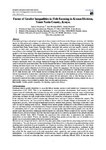Forms of Gender Inequalities in Fish Farming in Kwnza Division, Trans Nzoia County, Kenya.

View/
Date
2013Author
Kiumbuku, Samuel
Mutinda, Jane
Bernard, Jeanne
Metadata
Show full item recordAbstract
Fish farming being a sub-sector in agriculture has a major contribution to the Kenyan economy and therefore
should be fully promoted to enhance its productivity. To achieve this, women who form a large proportion of the
rural population should be fully empowered in order for them to participate in fish farming. The information
obtained from Trans Nzoia County Fisheries Office, indicated that women were not equally involved in fish
farming as their male counterparts did. The objective of the study was to determine the forms of gender
inequalities in fish farming? The target population of the study consisted of 400 fish farmers in the district with a
sample of 100 being selected. The target population was divided into two strata according to household headship.
The samples comprised of 50 male farmers and 50 female farmers (male-headed households and female headed
households) were selected from the two strata. The data was collected using interview schedules and observation
checklists. Qualitative data, in textual form was indexed and rearranged according to the appropriate part of
thematic framework which they related. Statistical Package for Social sciences (SPSS) Computer software was
used to analyse the quantitative data. The results showed that lack of formal education, land ownership, source of
funding and farm inputs were the main constraints facing women farmers. However, the study also established
that there wasn’t gender disparity in the following area: reasons for engaging in fish farming, access to extension
services, and availability of labor. Access to extension services was a constraint for both men and women with
26.2% male farmers and 14.9% female farmers reporting that they never received any services. Women were
further constrained by limited time to perform their roles as caregivers to their families as well as limited access
to technologies. It was therefore concluded that women did not participate fully in fish farming activities in
Kwanza Division as their male counterparts. The findings provide useful information to policy makers on how to
address the complex issues related to gender, food security and rural poverty.
